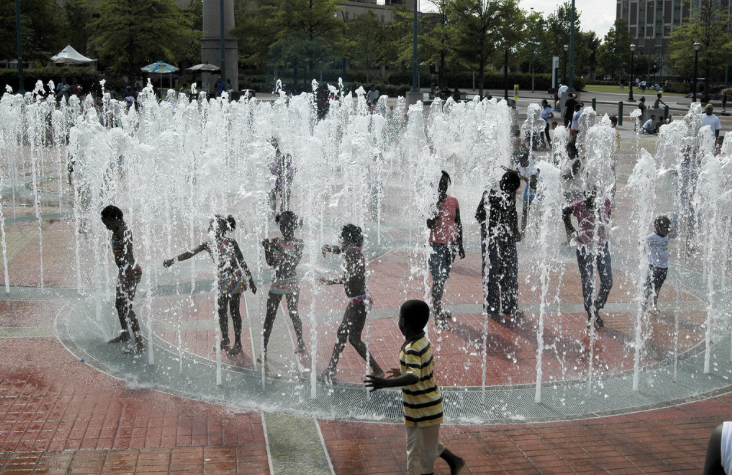Title Page
Where Cities Help Detain Immigrants. CityLab.
Introduction
Heat Check. Grist.
“Extreme heat is really becoming one of the most dangerous climate impacts,” says Annel Hernandez with the New York City Environmental Justice Alliance, which has made tackling the urban heat island effect the top priority in its climate justice agenda for this year. “While hurricanes and storm surge happen every five years or even longer, extreme heat is something that’s happening every single year.”
Executive Summary
As recovery funding makes it way to the Houston area following the devastation of Hurricane Harvey nearly one year ago, some of the storm's costs are still being worked out. A new report from the Federal Reserve Bank of Dallas looks at one under-discussed area in particular: municipal utility districts. Found across the state, these districts are most common in the Houston area. The report goes so far as to call them a "cornerstone of Houston residential development."
The districts supply water, sewage and drainage infrastructure in many housing developments in the area and have the ability to issue tax-exempt debt and collect taxes. Historically, the report notes, "MUDs provided the means to more quickly develop then-distant, massive parcels of land into master-planned communities such as The Woodlands, Kingwood and First Colony that were sometimes far from existing utility services." While the homes are traditionally more affordable, the report argues, homeowners often pay "larger initial tax" bills to pay off the district debt. And there's a lot of debt. As of April 1, 2018, Harris County had nearly $5 billion in outstanding MUD debt, according to the report, followed by $1.9 billion in Fort Bend County and $757 million in Montgomery County.
There are a few ways Harvey could affect the districts. "In the days following Harvey," the report notes, "Moody’s placed under review for downgrade the debt of 32 MUD districts where a large number of homes suffered flood-related damage." And with many affected homeowners inside the districts now struggling financially as mortgage loan delinquencies rose in the area immediately following the storm, the districts may face problems.
"In those flooded areas with significant property damage and little flood insurance, the recovery will be lengthy and property valuations are likely to sink, at least temporarily impacting tax revenue," the report concludes.
Conclusion
For too long, a recent op-ed in the Press-Telegram argues, Southern California has channeled rainwater through a storm drain network to the ocean, allowing it to "literally wash away." That may change as the Los Angeles County Board of Supervisors is set to consider a proposal from the Department of Public Works that would "capture, clean and conserve stormwater in communities across the county."
This, argues Richard Jackson, a professor emeritus at the Fielding School of Public Health at the University of California, Los Angeles, would address a critical public health concern that disproportionately burdens low-income communities exposed to polluted, toxic floodwaters. Steps to capture and clean that water offer multiple benefits, he argues, including additional green space, better stormwater management and new clean water available for future use.
"The result will not just save water," he writes, "it will clean our beaches, improve our parks, green and cool our neighborhoods, and improve our health, and even our enjoyment of life."
Endnotes
Hey, @Starbucks!
— Alice Wong (@SFdirewolf) July 11, 2018
How about offering both types of straws?
I still need a plastic straw w/ your new lids because I cannot lift a drink (see profile pic).
Your whole menu is about customization & options.
1 venti accessibility w/ a shot of customer service please! #StrawBan https://t.co/mKmoQuMoJy

